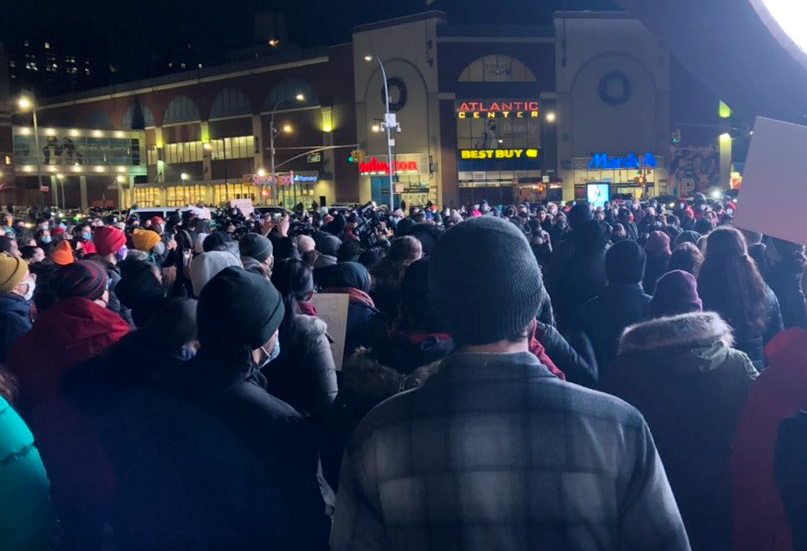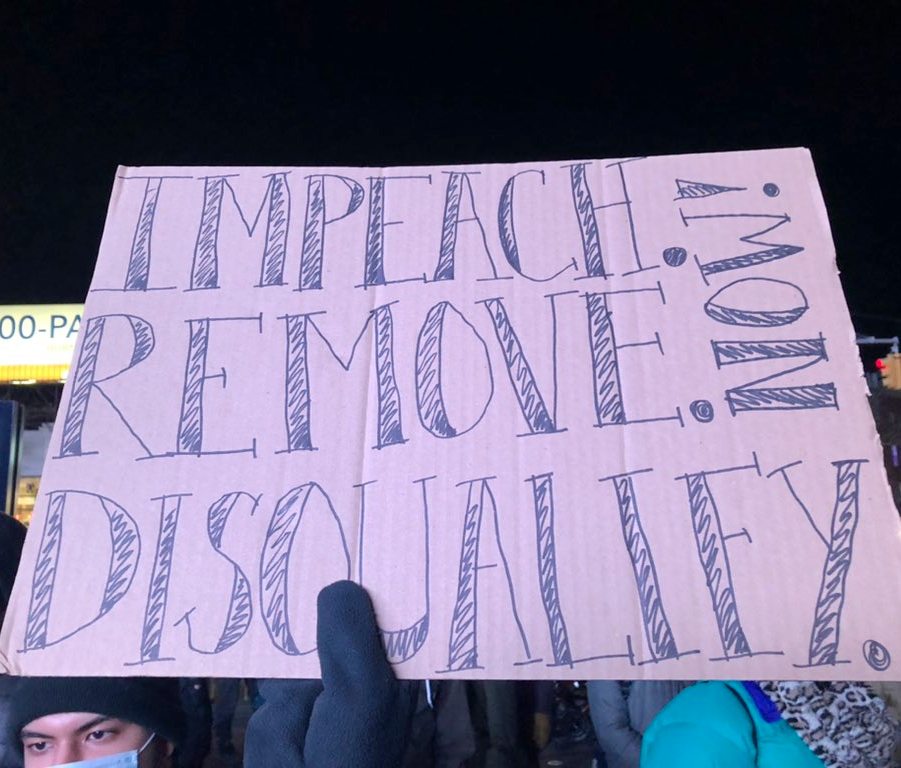The
House, Senator Cruz and
References
to the U.S. Civil War - Hardial Bains Resource Centre -
 
January
7, 2021. New York City protest calls for Trump to be impeached. (Liat_RO)
The House Judiciary Committee arguing for charging Trump with
"incitement to insurrection," and Senator Ted Cruz of Texas and the
Senators who joined him in challenging certification of the vote, all
use Civil War references to make their arguments. The
Judiciary report uses the 14th Amendment, section 3, arguing the charge
of "incitement to insurrection" is needed as the "threat that
manifested in the Capitol is ongoing. The emergency is still with us."
This refers to the threat of violence in DC and State capitols across
the country. The 14th Amendment is one of the three Civil War
Amendments (the 13th ratified in 1865 at the end of the Civil War, the
14th ratified in 1868 and the 15th ratified in 1870). The 14th
prohibits any person, member of Congress or officer of the U.S. who has
engaged in insurrection or rebellion from holding any office in the
U.S. The Committee says: "despite widespread bipartisan calls for
Trump's immediate resignation, the president has refused to leave
office," so they have to move to impeachment. Given that the grounds
for impeachment are that the President incited insurrection, the 14th
amendment can then be used to pass a vote in the Senate by simple
majority to say Trump is blocked from ever again holding office. That
is the punishment they are trying to achieve even after he leaves
January 20. At the time of the Civil War, the
battle between Congress and the Presidency and the Supreme Court was
also a main part of the fight. The Supreme Court said, in the event of
war, the government was liable for destruction of property, including
in relation to enslaved African Americans who were treated as property,
as things, not human beings. As a war, the laws of war would apply. It
would be necessary to delineate who is military, who are civilians, who
are prisoners of war, etc. As well, the Supreme Court and Congress
raised questions over Lincoln being Commander-in-Chief. The Supreme
Court challenged him, saying he had not been called into service, as is
stated in the Constitution. Even so, he did give himself authority as
Commander-in-Chief, but did not call the conflict a civil war or even
insurrection. Even though Lincoln said by law he
could not touch issues of slavery and promised not to do so in debates
prior to his election, the Democrats, representing the Slave Power,
basically said “we do not believe you.” All were
contending with various uprisings of the enslaved people at the time,
along with the raid on the U.S. arsenal in Harper's Ferry led by
abolitionist John Brown in 1859 which was an effort to strengthen the
rebellions by arming greater numbers. This took place before Lincoln's
first inaugural address, in March 1861, where he continued to keep away
from even mentioning civil war and slavery. He said things such as that
slavery was an amoral institution, but his address mainly promoted
reconciliation, for preserving the federal union under the Constitution.
The Democrats then in Congress rejected that and went back to
their various states and basically organized coups in their states.
Some at first tried to have assemblies and referendums but that did not
work as people were against secession. So they organized coups. Shortly
after, the Confederacy was formed, with its Articles of Confederation,
its own flag, army, uniforms, generals, etc. In April 1861 the
Confederate forces laid siege to and fired on Fort Sumter, the opening
battle of the Civil War. Lincoln still tried to
avoid calling it civil war or insurrection. He referred to the actions
of gangs, marauders, hooligans. It is not until his Gettysburg Address
in November 1863 that he called it civil war. The general argument he
supported was that slavery as a system was on its way out and free
labour was on the rise, thus slavery would die out on its own. It is
significant for arguments made today, which are pushing insurrection
instead of reconciliation, even though Biden presents himself as a
unifier. This includes calling for the removal of House Representatives
who challenged certification of the Electoral College Vote for being
"supporters of insurrection." The
Civil War was launched from states seceding from the United States. It
was launched as an insurrection against the U.S. state, a rebellion by
the slave-masters. It was not a war between states. If Lincoln accepted
it as war, it would be considered a war between distinct nations
states, and involve international relations and the laws of war. It was
also not simply to secede, but rather to also settle which forces would
dominate the Americas. People in Lincoln's cabinet were actually
offering Canada, Cuba and Nicaragua to the Confederacy, saying this
would give them lots of room to expand and manoeuvre. It would be
better to choose empire rather than wage war against the government,
they argued. But the Confederacy wanted it all. Most
of the generals in the Civil War got their experience in wars against
Mexico and with the westward expansion and its genocide and wars
against Indigenous peoples. This includes Confederate generals like
Robert E. Lee and Jefferson Davis (the general, not the head of the
Confederacy) as well as Ulysses S. Grant who led the Union Army as
Commanding General in winning the Civil War and subsequently served as
the 18th president of the United States from 1869 to 1877. The
Confederacy was not simply defending the system of slave labour but all
the connections serving their interests with northern merchants,
railroads and the world market of the day. Despite
the fact that between 600,000 and 700,000 people were killed during the
war, Lincoln did not even want to call it an insurrection. But on
January 11 the House wasted no time in calling the events of January 6
an insurrection, as opposed to a riot or a violent protest or other
similar language. By relying on the 14th amendment, first they have to
say Trump incited insurrection and then they can make use of the
content of the 14th Amendment to block Trump from holding office in the
future. The time period of the 14th Amendment,
which is during Reconstruction (1865-1877) was also raised by Senator
Ted Cruz on January 2, in the letter explaining why Republican Senators
were challenging certification of the election. The letter raises the
issue of the 1877 presidential election, the Hayes-Tilden race. That
time period was raised to delegitimize Biden's election. Cruz said in
the letter that for the 1877 dispute Congress did not dismiss concerns
about the election. He introduced the period of crushing
Reconstruction, with federal troops removed from the south in exchange
for which Hayes got the presidency. According
to arguments of the time, charges of insurrection were also used
against the workers fighting to defend themselves. Big upheavals were
happening in terms of the development of the U.S. state. The
trans-continental railroad was completed and there was a serious
depression after the Civil War, in 1873. By 1877 the Baltimore
&
Ohio railroad (B&O) was completed. In West Virginia, the
railroads
twice cut wages and workers went on strike. It turned into a national
strike and general strikes were held in specific cities like St. Louis
and Chicago. The national strike lasted from June to September of 1877
and saw some of the most violent battles, put down by federal troops
and the Pinkertons, a private police force. A lot of other workers such
as iron workers, steel workers and coal miners also went on strike and
used armed resistance. All were part of the battle for an eight-hour
day. There was recognition that the working class had emerged -- black
and white together. Newspapers of the time are filled with headlines
and arguments that the Paris Commune -- the revolutionary uprising of
French workers who seized control of Paris in 1871 and governed in the
interests of the workers -- was coming to the U.S. Cruz
picked up on this history. Reconstruction was a period that witnessed a
broad flowering of democracy, especially in the south where state
constitutions were being rewritten and debates on women's rights,
voting, representation, people's assemblies, were taking place. While
it was partly an opportunist argument, he also specifically picked a
period during which Reconstruction was smashed. Perhaps he is worried
there will be a repeat of the 1877 uprisings. The
fact that both the House and Cruz are referencing this period is
reflective of the reality today that the ruling factions, who no longer
have mechanisms like a functioning Congress and elections to resolve
conflicts, will drag the country into a violent civil war and that they
consider that the current movements of the people threaten their rule
as more and more demand a new direction for the economy and
politics. As W.E.B DuBois, a recognized
authority on the Civil War and Reconstruction said, both involved a
general strike and an effort by workers, black and white, to carry
forward the elimination of all enslavement.
This article was published in

Volume
51 Number 3 - January 20, 2021
Article Link:
The
House, Senator Cruz and References
to the U.S. Civil War
Website: www.cpcml.ca
Email: editor@cpcml.ca
|